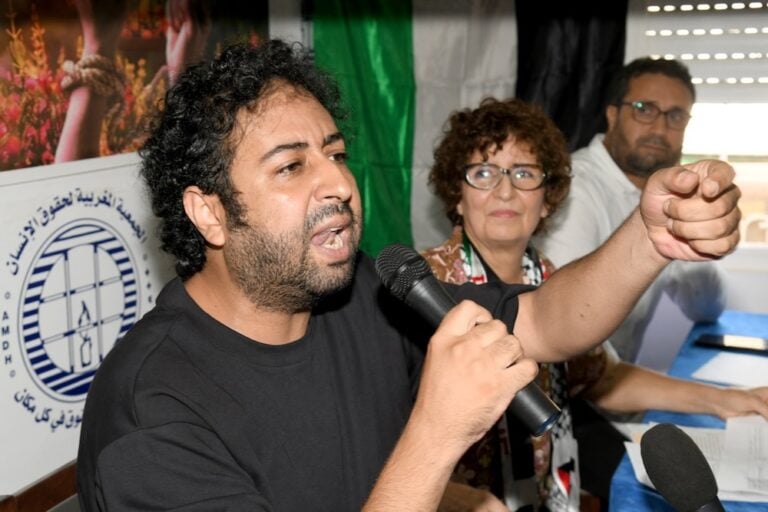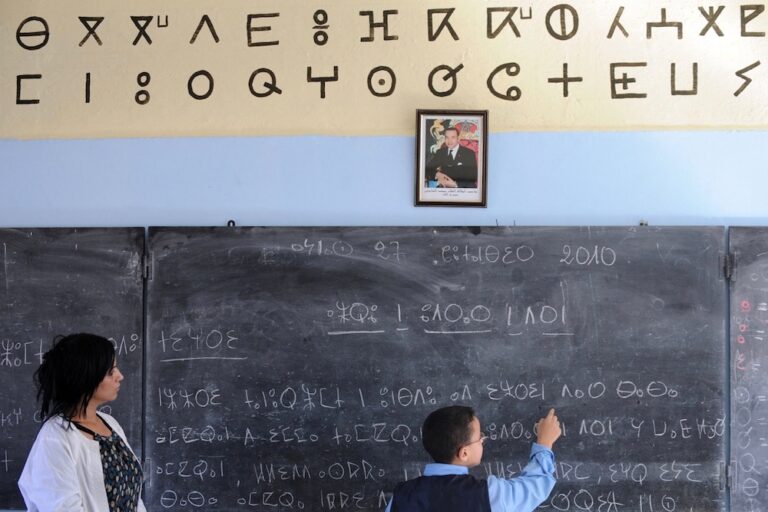(RSF/IFEX) – The following is a 12 May 2000 RSF press release: Seven newspapers censored, two journalists forbidden to write RSF launches an appeal to Mohammed VI for the respect of press freedom In recent months, seven Moroccan and foreign newspapers have been victims of censorship and two journalists are threatened with prison sentences and […]
(RSF/IFEX) – The following is a 12 May 2000 RSF press release:
Seven newspapers censored, two journalists forbidden to write
RSF launches an appeal to Mohammed VI for the respect of press freedom
In recent months, seven Moroccan and foreign newspapers have been victims of censorship and two journalists are threatened with prison sentences and are forbidden to practice their profession, a first in the history of Morocco. While the first months of Mohamed VI’s reign were marked by certain advances in press freedom, the whole of these measures is more than a step backward, a real attempt by the authorities to take back under control the press which takes up subjects judged “sensitive”, such as the future of Western Sahara, violations of human rights under Hassan II or the islamist movement. Reporters sans frontières launches an appeal to Mohammed VI to respond to the aspirations of the Moroccan people in terms of press freedom and to see to it that the kingdom conforms with the commitments that it has entered into, notably by ratifying the International Covenant on Civil and Political Rights.
On 5 February 2000, two French-language weeklies, Le Reporter and Le Quotidien du Maroc/Economie and an Arab-language publication, Al Moustaquil, were seized by the police. These newspapers had reproduced, partially or wholly, a memorandum from Cheikh Abdeslam Yassine, the leader of the country’s most important Islamic movement. On 15 February, an issue of Jeune Afrique-L’Intelligent was banned. It contained a text
from a Moroccan intellectual living in Quebec, Abdellah Labdaoui, who questioned the capacity of Mohammed VI to bring real reforms and to punish those who violated human rights under the reign of his father.
On 4 March, the French daily Le Figaro did not appear in kiosks, following instructions from the Ministry of the Interior. This issue contained an article on the book by the personal doctor of King Hassan II, François Cléret. According to Cléret, “the body [of opposition member Mehdi Ben Barka] was cut in pieces on Hassan II’s orders and brought to Morocco in diplomatic bags.”
At the beginning of April, the management of the weekly Demain asserted that the publication’s shareholders were subject to pressure “coming from circles close to power” to sell their shares to businessman Abdennasser Bouazza, who is “close to the Palace” according to manager Ali Lmrabet. The result: the new majority shareholder refused to sign the order for the transfer of funds for the printing of issue number 4 of the magazine. The weekly Demain had mentioned, in its three previous issues, sensitive subjects in the eyes of authorities such as the presence of the Israeli secret service in Morocco, the future of Western Sahara, and the Islamist movement. A week later, the newspaper was finally available in kiosks.
On 15 April, the weeklies Le Journal and Assahifa, both printed in France, were forbidden entry into Morocco. In its last issue, Le Journal had published an interview with the president of the Polisario Front, Mohammed Abdelaziz. The weekly Assahifa, which did not publish this interview, simply paid for the fact that it belongs to the same
group as Le Journal. The prime minister explained that this ban aims to reaffirming the [government’s] determination to deal firmly with any flippant treatment of the Moroccan people’s feelings.” As for the ban on Assahifa, the government eventually excused itself, on 28 April, for this “error”.
On April 17, three executives of the 2M television station, Larbi Belarbi, Mustapha Mellouk and Mohammed Mamad, were fired. Three days earlier, during a review of the press, a journalist had shown the front page of the last issue of Le Journal on the question of Western Sahara.
On April 27, Khalid Mechbal, journalist with the weekly Chamal, was given a six month suspended prison sentence. In addition, he was forbidden to practice his profession as a journalist for one year. On 3 May, Mustapha Alaoui, manager of the weekly Al Ousboue was sentenced to three months in prison and a three year ban on journalism. Both had published an article denouncing the conditions in which Mohammed Benaïssa, the current Minister of Foreign Affairs, had purchased a residence in Washington on behalf of the Moroccan Embassy while he was ambassador to the United States. A few days later, Mustapha Alaoui was sentenced to a three month suspended prison sentence for “defamation” of businessman Fouad Filali. In the columns of Al Ousboue, the journalist had accused Fouad Filali of “illegal transfer of funds from Morocco to France and money laundering”. These bans on the practice of journalism took immediate effect.
Reporters sans frontières asks the Moroccan authorities to put an end to this genuine harassment that mainly targets the independent press. The organisation also asks for the cancellation of prison sentences in cases of “defamation”. In a document dated 18 January 2000, Abid Hussain, United Nations special reporter on the promotion and protection of the right to free opinion and expression, urged “all governments to ensure that violations of press laws are no longer punishable by prison sentences, except for violations such as racist or discriminatory commentary or calls to violence.”


